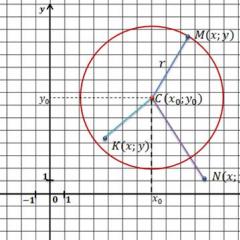Good for the autumn freshness. Yesenin sergey - well under the autumn freshness
Well under the autumn freshness
Shake off the apple-tree soul with the wind
And watch how it cuts over the river
The blue water of the plow sun.
Good to knock out of the body
A nail burning songs.
And in festive white clothes
Wait for the guest to knock.
I am learning, I am learning with my heart
Protect the color of the bird cherry in your eyes,
Only in avarice do feelings warm themselves,
When ribs breaks to leak.
The starry belfry hoots silently,
Every leaf is a candle to dawn.
I will not let anyone into the room,
I won't open the door to anyone.
1918-1919
Notes (edit)
A. B. Mariengof attributed the creation of the poem to the winter of 1919/20. He said that in the particularly severe cold of this winter, he and Yesenin moved from their unheated room to the bathroom: “We covered the bath with a mattress - a bed; washbasin with boards - desk; the water heater was heated with books. The warmth from the speaker inspired the lyrics. A few days after moving to the bathroom, Yesenin read to me:
The starry belfry hoots silently,
Every leaf is a candle to dawn.
I will not let anyone into the room,
I won't open the door to anyone.
Indeed: we had to defend the “promised bath” with our teeth and a heavy lock. The entire apartment, looking with envy at our warm, carefree existence, arranged meetings and passed resolutions demanding the establishment of a queue for living under the favorable auspices of the column and the immediate eviction of us, who seized the public square without a warrant ”(Rev., 1, 317).
1918
***
Well under the autumn freshness
Shake off the apple-tree soul with the wind
And watch how it cuts over the river
The blue water of the plow sun.
Good to knock out of the body
Song-burning nail
And in festive white clothes
Wait for the guest to knock.
I am learning, I am learning with my heart
Protect the color of the bird cherry in your eyes,
Only in avarice do feelings warm themselves,
When ribs breaks to leak.
The starry belfry hoots silently,
Every leaf is a candle to dawn.
I will not let anyone into the room,
I won't open the door to anyone.
Read by Yuri Bogatyrev
Yesenin Sergei Alexandrovich (1895-1925)
Yesenin! Golden name. The murdered lad. The genius of the Russian land! None of the Poets who came to this world had such spiritual strength, enchanting, all-powerful, soul-capturing childish openness, moral purity, deep pain and love for the Fatherland! So many tears were shed over his poems, so many human souls sympathized and empathized with each Yesenin line, that if it were counted, Yesenin's poetry would outweigh any and much! But this method of assessment is not available to earthlings. Although one could see from Parnassus - the people did not love anyone so much! With Yesenin's poems they went into battle in the Patriotic War, for his poems they went to Solovki, his poetry excited souls like no one else ... God alone knows about this holy love of the people for their son. Yesenin's portrait is squeezed into the wall family photo frames, placed on the goddess along with the icons ...
And not a single Poet in Russia has yet been exterminated or banned with such frenzy and stubbornness as Yesenin! And they forbade, and hushed up, and belittled in dignity, and poured mud - and they do it to this day. It is impossible to understand why?
Time has shown: the higher Poetry is by its secret lordship, the more embittered are the envious-losers, and the more imitators are.
Another great gift of God to Yesenin - he read his poems as uniquely as he created them. They sounded so in his soul! All that remained was to say. Everyone was shocked by his reading. Note, the great Poets have always been able to uniquely and by heart read their poems - Pushkin and Lermontov ... Blok and Gumilyov ... Yesenin and Klyuev ... Tsvetaeva and Mandelstam ... So, young gentlemen, a poet who mumbles his lines on a piece of paper from the stage is not a Poet, but an amateur ... A poet may not be able to do many things in his life, but not that!
The last poem "Goodbye, my friend, goodbye ..." is another mystery of the Poet. In the same 1925, there are other lines: “You don’t know that life is worth living!”
Yes, in the deserted city lanes, not only stray dogs, "smaller brothers", but also big enemies listened to Yesenin's easy gait.
We must know the true truth and not forget how his golden head was thrown back like a child ... And again his last breath is heard:
"Dear ones, good, good ..."
Sergei Alexandrovich Yesenin is a great Russian poet who entered the history of world literature as a heartfelt and refined author of lyric works. His poetry is imbued with sincerity and spontaneity, these criteria and distinguish the famous poet from other authors.Yesenin perfectly expressed his feelings, competently choosing each rhyme. Reading his poems, you are transported into the world described by the author, a distinct landscape filled with vibrant colors and harmony becomes noticeable. His work is like a frank conversation with listeners. The poet himself admitted that he writes his lyric works, as if for close friends, putting his whole soul and frankness into his lines.
And at the same time, Yesenin was a deep thinker with complex and sometimes contradictory feelings, pumping passionate notes into his extraordinary lyrics. Russian author is revered in different countries of the world, and the magnificent poet gained this glory quite deservedly!
The theme of nature in the work of the great poet
The theme of nature was covered by many lyrical authors, but no one was able to glorify its beauty and unique views, with such enthusiasm and devoted romanticism. Yesenin presents Russian nature in the most original genre. His poems, like a pleasant melody, reveal a vulnerable soul to readers natural phenomena whose feelings are comparable to human emotions.
Detailed descriptions of landscapes, often found in Yesenin's work, are not an artistic transmission of the visual background. The author described the beauties of nature, passing them through the very soul. Often, childhood memories that remained with the poet forever served as an impetus for the lyrical mood.
The work of Sergei Alexandrovich is recognized by the world community. Hundreds of critics admire his ability to colorfully convey natural motives in a rhymed form. Yesenin, like no one else, was able to revive Russian nature in the eyes of the reader, to show the natural beauty and uniqueness of colors, which are especially highlighted in the autumn period of the year ...
Autumn in the work of Yesenin
 Each poet idolized his own season. Someone was close to winter landscapes, other authors sang the spring streams and the sonorous song of birds. Yesenin gave preference to autumn, it seemed that this time of year somehow inspired the talented poet in a special way to create another poem, and he was right!
Each poet idolized his own season. Someone was close to winter landscapes, other authors sang the spring streams and the sonorous song of birds. Yesenin gave preference to autumn, it seemed that this time of year somehow inspired the talented poet in a special way to create another poem, and he was right! Autumn lyrics have sunk into the soul and the reader. Great rhymes are studied with interest in school curriculum even children preschool age they quickly grasp the melodic lines glorifying the autumn landscapes of their native country.
Autumn, in the poems of Sergei Yesenin, is always mysterious and lyrical, sometimes sad and somewhat pensive. The poet conveys the mood of tired nature with special inspiration, although, for this time of year, the feeling of fatigue, anxiety and some depression is more relevant. It seems that these feelings do not tire the author, but, on the contrary, give unreal strength to create brilliant poems that are loved by the entire world community.
Yesenin, like no one else, managed to describe this wonderful time of the year in a special, refined form. According to his lyrical works, autumn is perceived as a young and tender time, but at the same time wise and purposeful. In this incredible melancholy, different emotions and feelings are intertwined: passionate love and indescribable loneliness, insane joy and bitter disappointment, wonderful mood and inclement melancholy ...
Sergei Alexandrovich Yesenin always picked up successful rhymes. His poems about autumn are full of touching and warm words that emphasize the magnificent beauty and harmony of Russian nature.
What is autumn characterized by? Cold air flow, chilly breeze, lingering clouds and sudden rain. This time of year prepares nature for winter, which is inexorably approaching its native land. It is not always possible to consider all the beauty of the autumn season, however, it was brilliantly succeeded by the talented Russian poet of the XX century - Sergei Yesenin!
Well under the autumn freshness
Well under the autumn freshness
Shake off the apple-tree soul with the wind
And watch how it cuts over the river
The blue water of the plow sun.
Good to knock out of the body
A nail burning songs.
And in festive white clothes
Wait for the guest to knock.
I am learning, I am learning with my heart
Protect the color of the bird cherry in your eyes,
Only in avarice do feelings warm themselves,
When ribs breaks to leak.
The starry belfry hoots silently,
Every leaf is a candle to dawn.
I will not let anyone into the room,
I won't open the door to anyone.
Foggy weather, golden foliage, rainy romance and the invigorating power of a light autumn breeze are skillfully described by the author, pumping the brightest and most pleasant emotions on the reader. Yesenin superbly depicts every phenomenon that is relevant for a given time.

Describing atmospheric phenomena, the poet chooses a pictorial representation, expressing his observations figuratively. Anthropomorphic and zoomorphic comparisons are clearly visible in the work. In the poetry of another famous author - Alexander Alexandrovich Blok, the wind is presented as an astral, and even a cosmic phenomenon. And in Yesenin's poems, he gains some kind of animation.
In many lyric works of Sergei Alexandrovich, there is an excellent description of the celestial month and the enchanting moon. The poet masterfully emphasizes its unique form, excellent silhouette and simply stunning light "subtle lemon" or "moon blue".
According to critics, detailed descriptions the moons bring special romance and elegiac motives into the poems of the great Russian author. But the rhymes about the pictorial month are compared with folklore, because this heavenly body appears in Yesenin's work as a glorious character from a good fairy tale.
Yesenin touched upon various elements of the surrounding nature in autumn poetry: a picturesque Russian forest, beautiful trees in golden outfits, animals preparing for hibernation and other equally important and fairly natural images. His autumn poetry is impressive and inspiring!
The golden foliage swirled
The golden foliage swirled
In the pinkish water on the pond
Like a flock of butterflies
With a daze flies to the star.
I'm in love tonight tonight
The yellowing valley is close to the heart.
Boy-wind to the very shoulders
He poured the hem on a birch tree.
And in the soul and in the valley there is coolness,
Blue dusk like a flock of sheep
Behind the gate of the silent garden
The bell will ring and freeze.
I have never been frugal
So I did not listen to the rational flesh,
It would be nice, like willow branches,
To tip over into the pinkness of the waters.
It would be nice, smiling at the haystack,
Chew hay with the muzzle of the month ...
Where are you, where, my quiet joy,
Loving everything, wanting nothing?
Analysis of the poem "Leaves are falling, leaves are falling ..."
 The poem "Leaves are Falling, Leaves are Falling" was written by the author at the end of summer, in 1925. During this period, Yesenin was going through a difficult crisis of his personal life, which was clearly reflected in the written lyric work. Reading the lines of this verse, the author's total fatigue, his confusion in relation to himself and those around him, is morally felt.
The poem "Leaves are Falling, Leaves are Falling" was written by the author at the end of summer, in 1925. During this period, Yesenin was going through a difficult crisis of his personal life, which was clearly reflected in the written lyric work. Reading the lines of this verse, the author's total fatigue, his confusion in relation to himself and those around him, is morally felt. The semantic plan of the work is based on the transfer of emotional experiences, Sergei Yesenin boldly declares his regrets associated with the lost youth. He seems to be trying to sum up his own life ...
In his rhymes, a malicious premonition of his own death is heard. From the very first lines, the author's pessimism, his melancholy and heartache are subtracted. He longs for joyful changes or typical calm, but windy weather seems to confuse all the thoughts of the creator, preventing the mind from making the right decision and determining its own desires.
In the last lines of the poem, the poet expresses his distrust of female sex, there is some contempt for the wicked human relations and unjustified love. Now the author reflects on what could radically change the internal contradictions and calm the soul. The lyrical character is trying to find his beloved, in whose powers the pacification of a sick soul and a broken heart of an afflicted poet.
Yesenin was looking for such a woman for a long time, but, apparently, like the hero of this poem, he failed to translate what he wanted into reality ...
"Leaves are falling, leaves are falling ..."
Leaves are falling, leaves are falling.
The wind is moaning
Long and deaf.
Who will please your heart?
Who will calm him down, my friend?
With aggravated eyelids
I look and look at the moon.
Here again the roosters crowed
Into subdued silence.
Before dawn. Blue. Early.
And grace flying stars.
Would make any wish
I don’t know what to wish for.
What to wish for under the burden of everyday life,
Cursing your lot and your home?
I would like a good one now
See the girl under the window.
So that with her eyes cornflower blue
Only me -
Not to anyone -
And new words and feelings
Calmed the heart and chest.
So that under this white moon,
Accepting a happy lot
I did not melt over the song, did not melt
And with someone else's cheerful youth
I never regretted my own.
Analysis of the poem "Autumn"
The poet fills autumn with bright colors, but at the same time points to the inherent fading of nature at this time. If you combine all the images presented in the poem, you can reveal the main essence laid down by the lyrics: the image of the autumn season conveys to us an understanding of the transience of human life, it, like a sad time, cannot be stopped in order to keep it for a long time ...
The life of natural nature is comparable to the life of every person. Nature loses its colors and the summer aroma of fragrant plants, like our life, leaves without looking back, leaving pleasant memories of the lost years of youth.
The wind in the lyric work of Sergei Yesenin represents the image of freedom, and the red rowan berries can be compared with the bloody wounds of Jesus Christ. These lines show the idea of redemption based on the mistakes and sins of youth.
"Autumn" - beautiful poem talented poet Sergei Yesenin, filled with deep philosophical meaning. By carefully reading the rhymes, you can remove the main essence lyric work conveyed by the brilliant author to every listener ...
Autumn
Quiet in the thicket of juniper along the cliff.
Autumn, red mare, scratching her manes.
Over the river bank
The blue clank of her horseshoes is heard.
Shemnik-wind with a careful step,
Crumples foliage over road ledges.
And kisses on a rowan bush,
Red ulcers to the invisible Christ.



